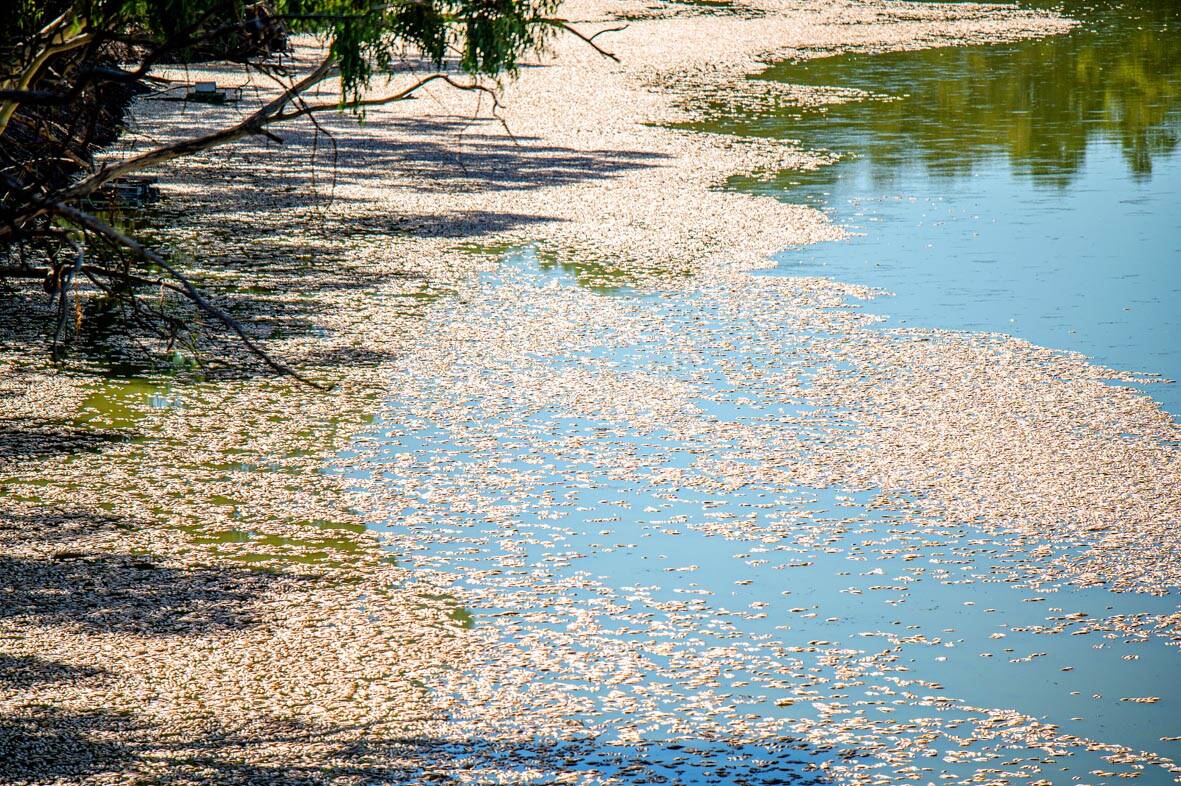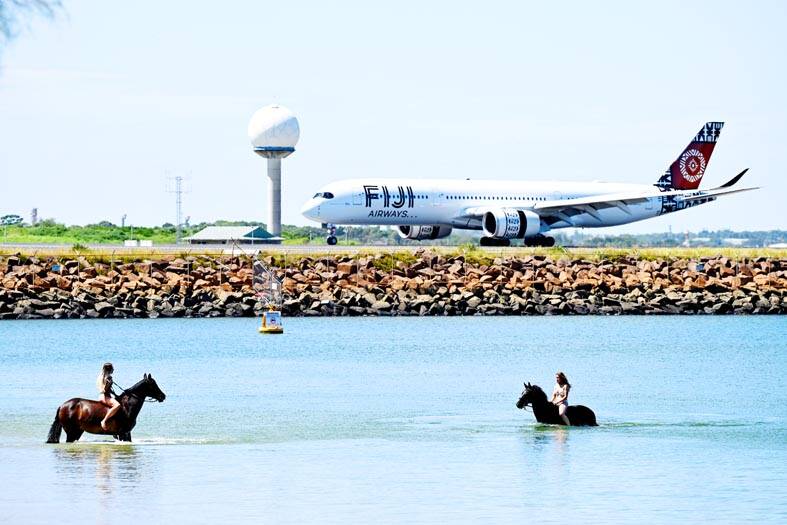Dozens of Australian heat records were smashed over the weekend, as the Australian Bureau of Meteorology forecasted a warmer than average autumn ahead.
Miriam Bradbury, a senior meteorologist at the weather bureau, said that many locations in New South Wales on Sunday recorded their hottest March day ever.
“We saw dozens of temperature records broken,” she said.

Photo: EPA-EFE
On Saturday, records were set at various locations in South Australia, as well in Mildura in Victoria, Bradbury said.
“But [on Sunday] the heat really contracted into New South Wales,” she said.
Bradbury said that top temperatures reached about 44°C in parts of the southeastern states.

Photo: EPA-EFE
Records set included: 39.9°C, 39.6°C and 37.6°C in New South Wales’ Wagga Wagga, Dubbo and Goulburn respectively; 42.5°C in Mildura; and 43.3°C and 42.3°C in South Australia’s Roxby Downs and Leigh Creek respectively.
Canberra on Sunday hit 37.4°C, its hottest March day in 25 years, and 0.1°C off the March record of 37.5°C.
Sydney’s March daily high temperatures are averaging higher this year (29.1°C) than the historical March mean (24.8°C), but Bradbury said that no individual temperature records had been set in the city.
“Towards the southwest suburbs, we did have a couple of late-season maximum temperature observations for certain stations,” she said. “Basically it means this is the latest we’ve ever seen it this hot, but it’s not a record either annually or for the month.”
The hot weather arose from a combination of a high pressure system across Australia’s southeast, and a trough that extended from the Kimberley region in Western Australia toward the southeast of the country, which deepened during the week, Bradbury said.
“A lot of heat that was sitting over central parts of the country, even over parts of Western Australia, started to shift eastward and southward,” she said.
She predicted there would be a reprieve for the southeastern states over the next two weeks, with slightly below average temperatures forecast.
“But if we look further ahead, on a one-to-three-month basis, we do see that trending the opposite direction,” she said. “We’re more likely to see warmer than average conditions as we move through that April-to-June period.”
“The impact of climate change in general is a warming trend,” she added. “But on a month-to-month or even week-to-week basis, we do see this natural variation in the temperatures across the whole country.”
Joel Pippard, a meteorologist at Weatherzone, said the late blast of heat was largely driven by a negative swing in a climate driver called the southern annular mode (SAM), which refers to the north-south movement of the strong westerly winds.
“In a positive phase, cold fronts contract closer to the south pole and provide more high pressure near Australia, and during a negative phase, cold fronts more regularly cross southern Australia,” Pippard said in a statement.
“For the entirety of 2022, the SAM was in a predominantly positive phase, leading to more high pressure and increased easterly winds over the nation’s east coast,” he said.

MONEY GRAB: People were rushing to collect bills scattered on the ground after the plane transporting money crashed, which an official said hindered rescue efforts A cargo plane carrying money on Friday crashed near Bolivia’s capital, damaging about a dozen vehicles on highway, scattering bills on the ground and leaving at least 15 people dead and others injured, an official said. Bolivian Minister of Defense Marcelo Salinas said the Hercules C-130 plane was transporting newly printed Bolivian currency when it “landed and veered off the runway” at an airport in El Alto, a city adjacent to La Paz, before ending up in a nearby field. Firefighters managed to put out the flames that engulfed the aircraft. Fire chief Pavel Tovar said at least 15 people died, but

LIKE FATHER, LIKE DAUGHTER: By showing Ju-ae’s ability to handle a weapon, the photos ‘suggest she is indeed receiving training as a successor,’ an academic said North Korea on Saturday released a rare image of leader Kim Jong-un’s teenage daughter firing a rifle at a shooting range, adding to speculation that she is being groomed as his successor. Kim’s daughter, Ju-ae, has long been seen as the next in line to rule the secretive, nuclear-armed state, and took part in a string of recent high-profile outings, including last week’s military parade marking the closing stages of North Korea’s key party congress. Pyongyang’s official Korean Central News Agency (KCNA) released a photo of Ju-ae shooting a rifle at an outdoor shooting range, peering through a rifle scope

South Korea would soon no longer be one of the few countries where Google Maps does not work properly, after its security-conscious government reversed a two-decade stance to approve the export of high-precision map data to overseas servers. The approval was made “on the condition that strict security requirements are met,” the South Korean Ministry of Land, Infrastructure and Transport said. Those conditions include blurring military and other sensitive security-related facilities, as well as restricting longitude and latitude coordinates for South Korean territory on products such as Google Maps and Google Earth, it said. The decision is expected to hurt Naver and Kakao

India and Canada yesterday reached a string of agreements, including on critical mineral cooperation and a “landmark” uranium supply deal for nuclear power, the countries’ leaders said in New Delhi. The pacts, which also covered technology and promoting the use of renewable energy, were announced after Indian Prime Minister Narendra Modi and Canadian Prime Minister Mark Carney hailed a fresh start in the relationship between their nations. “Our ties have seen a new energy, mutual trust and positivity,” Modi said. Carney’s visit is a key step forward in ties that effectively collapsed in 2023 after Ottawa accused New Delhi